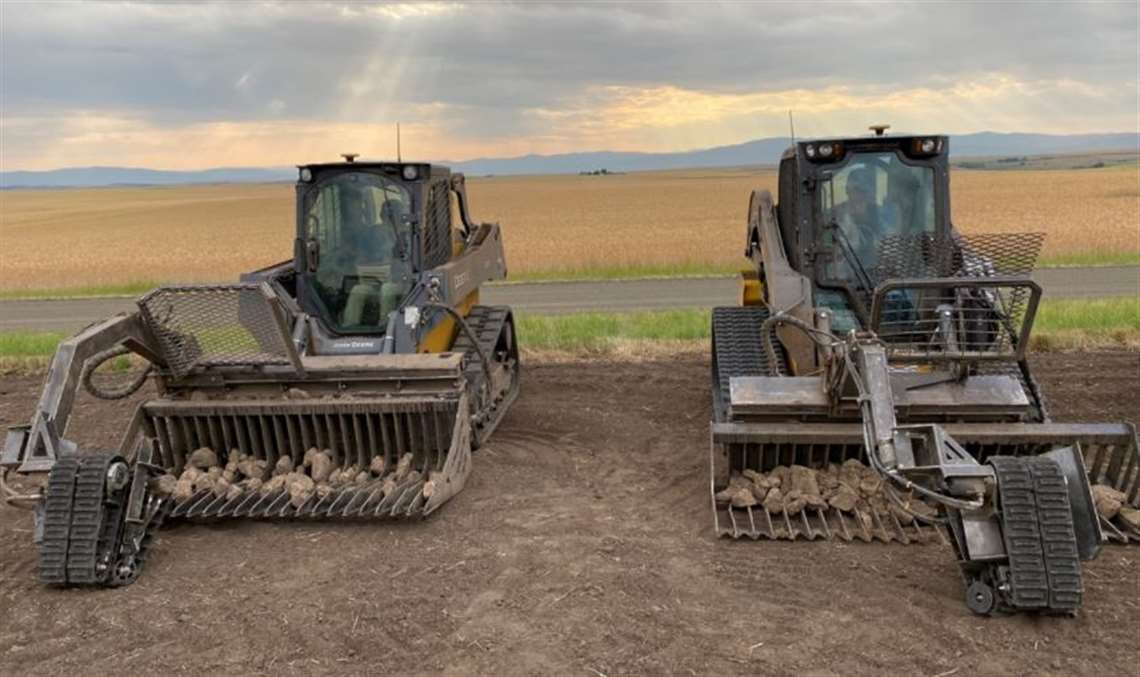TerraClear gets funding, talks about Rock Picker’s future
28 May 2021
TerraClear’s Rock Picker picks an average of 400 rocks per hour.
TerraClear, an applied AI and robotics start up, has announced Series A funding of $25 million led by Madrona Venture Group, bringing the company’s total funding to $38 million.
Rocks in fields break machinery, slow precision farming, and take up valuable time that modern farms do not have, said the machine’s developers. TerraClear’s Rock Picker picks an average of 400 rocks per hour and can pick up rocks of up to 300 lb. In the past year, the company has deployed early versions of its solution that both map and clear fields of rocks.
Founder and CEO Brent Frei grew up on his family’s farm in Idaho and returned to this passion after founding and growing a tech company.
“This is something I’ve personally dealt with my entire life,” said Frei. “There are more than 400 million arable acres worldwide that have been waiting for a cost-effective and productive solution to this problem. Repetitive tasks like this are optimal targets for automation, and the technologies we are bringing to the field dramatically reduce the labor and time needed to prep fields for planting.”
 The TerraClear Rock Picker is an attachment for compact track loaders and skid steers with more than 60 hp.
The TerraClear Rock Picker is an attachment for compact track loaders and skid steers with more than 60 hp.
“The TerraClear team has incredible passion and expertise in both the customer base and the technology needed to address this huge problem for farmers. Rock picking fits into the category of dull, dangerous, and dirty. It’s a perfect application of robotics and AI and we are excited to back this team and mission,” said Matt McIlwain, managing director, Madrona Venture Group.
Earlier this year, TerraClear released its first Rock Picker, which the company said quickly sold out and the second run is expected to be delivered at the end of this summer.
Rock Picker enables customers to remove rocks with the touch of a button, said the company. It is mounted on a compact track loader or skid steer with more than 60 hp and will soon be compatible with front-end loaders on tractors. The company said it takes less than five minutes to mount and works in any field condition.
The company said its product roadmap for the future include integrating AI and computer vision with a fully autonomous rock picker platform, creating a “Roomba for rocks.”
“We’re working every day towards a fully autonomous solution for rock picking – and that is a multi-year project. Along the way, we’re building solutions that solve this problem better than anything out there,” said President Trevor Thompson.
TerraClear also offers mapping and clearance services for those looking for a plug and play solution to picking rocks. Working with TerraClear or third party drone services, Terraclear maps fields, uses AI to locate large rocks and then deploys the Rock Picker to clear the field.
In addition to scaled production and sales in 2022, the company said it expected to use the injection of capital to accelerate the development of autonomy and grow the team in Washington and Idaho.
STAY CONNECTED




Receive the information you need when you need it through our world-leading magazines, newsletters and daily briefings.
POWER SOURCING GUIDE
The trusted reference and buyer’s guide for 83 years
The original “desktop search engine,” guiding nearly 10,000 users in more than 90 countries it is the primary reference for specifications and details on all the components that go into engine systems.
Visit Now
CONNECT WITH THE TEAM










